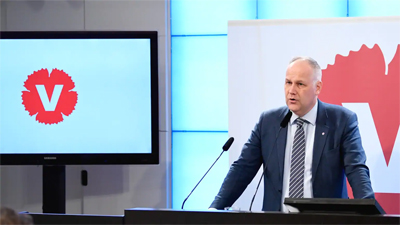
pic: Per Gudmundson, SvD
Remember back in November, when Jonas Sjöstedt threatened to bring a no confidence vote to the floor to protest the government’s plan to completely reform the Swedish Public Employment Service (better known as Arbetsförmedlingen)? If you forgot, there’s a post to read about it here. And if you didn’t, well, time is almost up. If nothing happens, the vote of no confidence on Eva Nordmark, Minister for Employment, will happen on Tuesday.
When Sjöstedt, leader of the Left party, first made this threat, he was not just protesting the disassembly and privatisation of the Employment Service, but also the provision of the January Agreement that said that under no circumstances was the Left party to have any influence over government policy. The provision was stipulated by the Center and Liberal parties specifically as a requirement for their support for the formation of the Löfven government.
It’s understandable that this was part of the Left party’s anger, as the government is absolutely dependent on the Left party to stay in power (otherwise they don’t have the votes to pass their budget). Still, it was likely the government thought that they were safe because the Left party would never vote with the Sweden Democrats, and the two right block parties, to topple them…

Until today, it turned out, when the Left party became willing to do just that. Apparently, the meetings held between the Social Democrats and the Left party have not been assuaging enough. The Left party is determined to change the course of the government in respect to the current privatisation of the Employment Service.
Despite the appearance of a wrench being thrown into the disassembly work, threats being tossed about, and very serious looks on all party leader’s faces, it’s likely most of them are glad for Sjöstedt’s moves. The Unemployment Services’ quick and dirty disassembly was causing a lot of worry and problems at the municipal level: When workers are getting unemployment help they do it through the Employment Service. Without an Employment Service office nearby, the sooner the unemployed would turn to the local municipality for help – and that would be expensive, as well as more than the municipalities thought they could handle.

With the way things were going, it looked like a disaster was shaping up. Despite having previously been very much in favor of dismantling the Employment Service, the Moderate party and the Christian Democrats are now saying that they have always thought the deconstruction was going too quickly, and that’s why they are backing Sjöstedt. They are also happy when their former Alliance parties, the Center and Liberal parties, don’t get what they said they were going to get by leaving the Alliance and throwing their support behind the Social Democrats: If they can make the Center and Liberal parties look bad, the Moderate and Christian Democrats won’t be fussy about how.
Even Löfven is secretly happy because he has definitely not been a fan of this process, but was forced into moving quickly by the Center and Liberal parties and the agreement they signed back in January. The Left, Moderate, and Christian Democratic parties are actually doing him a favour if he can get out of it.
What remains to be done is for Löfven to spend the next few days finding ways to pacify the Center and Liberal party leaders and help them find ways to save face when the Unemployment Service is now not going to be disassembled as rapidly as first imagined. The Center and Liberal parties know that if the no confidence vote goes through, the government will be significantly weakened and they could find themselves on their own. A way to avoid this is most likely going to be found.
Meanwhile, Minister Eva Nordmark must be feeling a bit like a punching bag. A no confidence vote is supposed to mark no confidence in the Minister. The Left, Moderate, and Christian Democratic parties, plus the Sweden Democrats, though, are not actually protesting her, or the way she is doing her job: They’re using a no confidence vote against her to not just protest a current political course of action, but to get back at the government and its supporting parties. It’s going to be hard to see any impressed faces on the voters anytime soon.







